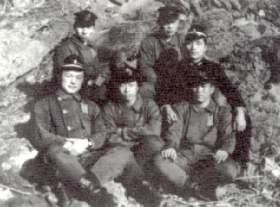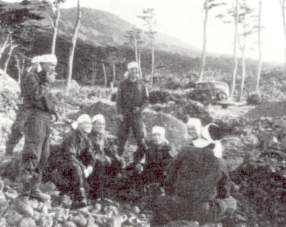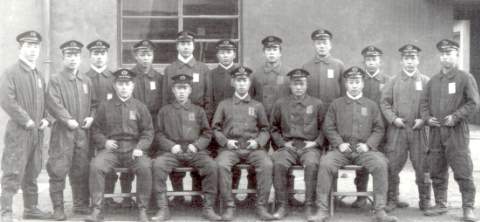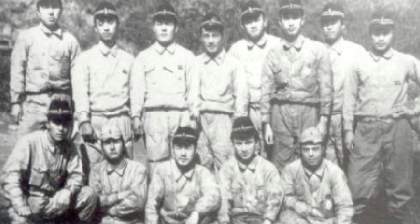
Picture taken between trainings (graduates of the 72nd Naval Academy)
Front from the left: Sub-lieutenants Konada, Kakizaki and Kawasaki
Back from the left: Sub-lieutenants Doi, Fukushima and a paymaster Kubozoe
From Newsletter "Tokko (Special Attack)"(May 1999)
Interviewee: Toshiharu Konada (Chief
of the Squad II of Kaiten Mission at Hachijo-jima Island Base, a
graduate of the 72nd Naval Academy)
Harumi Kawasaki (The 23rd Squad at Suzaki, Kochi, a graduate of the
13th Youth Flying Corp)
Interviewer: Lieutenant Commander Hiroshi Isobe (Maritime
Self-Defense Force, Headquarters, Yokosuka)
Lieutenant Kazuo Ishimoto (Maritime Self-Defense Force, Headquarters,
Yokosuka)
Isobe: During the war, you were all determined to protect the country. Under such circumstances, I think many applied for the Kaiten mission. Here, I would like to ask about the guideline for recruiting Kaiten pilots. How were Kaiten pilots selected?
Konada: Absolute volunteer for reserve student officers and
graduates from Youth Flying Corp. Kaiten pilots were carefully
selected from the applicants.
Upon the graduates from Naval Academy, those who proposed to use the
same kind of weapons as Kaiten were selected. Other graduates from
Naval Academy were assigned to the Kaiten mission. They got
transferred to this mission. Later on, there were some who were asked
whether they would like to go or not. But no one asked us, graduates
from Naval Academy, whether to apply or not.
Isobe: Unilaterally appointed?

Konada: I was selected as a Kaiten pilot without any notice. However, the assignment to such an important mission was a great honor to me. If asked, it's quite natural for me to join. I am still proud of it, because it proved that I was considered to be well-qualified.
Ishimoto: At that time, I think all of you did not have enough time for training, did you? Was the training period enough to be capable?
Konada: The number of Kaiten was very few to pilots. Also it took a lot of time for the maintenance. Even if we requested, we could not get more trainings. Our trainings became nothing but an intensive one. But after our own trainings, we all looked carefully at the others' trainings and also discussed and studied very hard every night at the meeting for the study of Kaiten. I think we all could improve our skills very quickly.
Kawasaki: Each of us could board Kaiten about 20-25 times. One training took about one hour, then total training was about 25 hours. But the first several times took only 30-40 minutes. That is, with only 20 hours training, we had to be skilful. Otherwise we could not be sortied.
Konada: Kaiten pilots were selected after examining each one's suitability. But also they were checked in actual practice. Considered not promising, they had to wait. Kaiten pilots with better skill were sent to the front first.
Isobe: Were you all single at that time?
Kawasaki: For the recruiting Kaiten pilots, unmarried was the prerequisite. There were two married men. One got married during the war. The another didn't have their marriage status on the register. Both were Reserve Student Officers. The others were all single.
Isobe: What about your parents?
Kawasaki: The guideline for recruiting stated that Kaiten pilots should be selected from those who do not have to be anxious about their families and affairs after their death. Having brothers to take care of parents was the another condition.
Konada: Looking back now, I think there were many who had girl friends.
Isobe: Were you offered to get some days off to visit your family before your sortie?
Konada: Yes. But I think none of them told their families about their mission.
Isobe: Was it because Kaiten was confidential?
Konada: Partly yes. But at the same time, they didn't want their families worry about them. Reading their records, I found all of them behaved just as usual. They came back to the base after saying good-bye to their family in their heart. It was absolutely impossible for us to tell our parents that we're going to die. It just made our parents feel sad. It's enough for us they would know after our death.
Kawasaki: Their families noticed something unusual in their behavior as they came home suddenly. Those who were sent to the distant places like Karafuto, Hokkaido, Taiwan could not go back to their hometown. They spent their time, visiting their friends and came back.
Ishimoto: Please allow me to say from the viewpoint of those who are living under the present circumstances. You must have prepared for the death during the war. But if you were assigned to other mission, it did not necessarily mean that you had to die. What did you think about that?

Konada: As I wrote something about it, we all thought without giving up our lives we could not protect the land and the people in Japan. There was no other way for Japan but went to ruin if we didn't take any other measures. We thought we should voluntarily die if our lives could be of any help to prevent it.

Kawasaki: First of all, graduates of Youth Flying Corps were the men who applied for the Youth Flying Corps which was much more dangerous than the other corps, that was the place to train pilots. Still they applied for Kaiten pilots. They all felt their death as a mattrer of course. They cared how successfully hit enemy ships.
Isobe: For the past 25 years I've been working as a pilot,
I experienced to think it was all up with me several times. In the
next moment many memories were brought back in rapid succession.
First my wife, children then came my parents and brothers. Even in a
short time, I managed to persuade myself, prepare for the death, with
the feeling 'I'm dying like this.' Every time I felt this, I have
lost interest in owning something. Now, strangely enough, I became
disinterested.
How about Kaiten pilots? I wonder they all prepared for their death
under the war situation. Today I would really like to ask about this.
Konada: We all thought we've already given up our lives since we entered Naval Academy. Even so, when I saw Kaiten for the first time, I stopped to think all over again. Many memories were endlessly brought back to me. I think everyone did the same. I struggled for 2-3 days to find out for what I live and for what I die. After I found out the reason, I had nothing I'd like to have, nor the things I feared.
Isobe: You felt the same as me. It was strongly felt that Japan was losing the war.
Konada: Around September 1944, we didn't think Japan would lose the war. We've never dreamt of Japan's surrender. But, we predicted if we fought it out, our mainland would be changed into the battlefield, leading to the extinction of the Japanese or the situation close to the extinction. Without sinking enemy ships by changing myself into a bullet, we all had to face such situation. We all thought we were given the best measure to make the most of our lives and ability.
Isobe: As a soldier, you never thought about the Japan's war defeat, but you may have noticed that Japan was losing.
Konada: Yes, I think most of us thought secretly in the latter half of 1943. Just following the conventional way would not work. But we never thought we should stop the war. For example, Oda Nobunaga only with a small military force, beaten Imagawa Yoshimoto who lead a vast troop.(*) We thought there must be some ways left to win like this. Each of us should do our best by making the most of our ability, I thought. Whether we could make it or not. I appreciated the opportunity given to us to realize our thoughts, that is the Kaiten, an unprecedented weapon.
* Battle of Okehazama: The first battle in which Oda Nobunaga, a war lord in Owari area (present Nagoya) won toward the unification of the nation in 1560.
Isobe: How did you feel when you were waiting for the sortie? I myself had no experience to be placed in such an extreme situation.
Konada: I really felt I would like to be sent earlier. Even though I understood I would be sure to die some days after my sortie, I could not help but wait for my sortie. Not just me, but all of us felt like this. I served as a Squad Chief, and I was asked by other Kaiten pilots to select and send them so many times.
Isobe: Once you sortied, you had no chance to be back alive.
Konada: We all knew about that.
Isobe: What's the fear for the death like?
Konada: I never felt the fear at that time. I heard many people were surprised to find Kaiten pilots on the sub were just calm and behaved the same as usual. They did not care about their death. Things they cared was to hit enemy ships, no matter what. What they cared was whether they could accomplish their mission, that is, whether their lives could be of any help for the country or not.

Isobe: Was it possible to prepare yourself for the death right after you're assigned to the mission?
Kawasaki: Even before it. Applying for that squad means we had already made up our mind.
Isobe: Thinking about the country's situation made you decided......
Kawasaki: I had no such presumptuous thoughts in mind. I just thought I would be the one to change this situation. I don't remember whether I said "Banzai" to the Emperor or not.
Isobe: They are totally different from our feelings now, must be reflecting the times.
Konada: Objectively seen, the situation was really
different from now. At that time, our land and the people were going
to be destroyed. We could not help but tell the things under these
circumstances. But we should not dispose of everything just by saying
this. No one can tell that our nation will never have the time to
face the racial crisis again. We all should know these things did
happen and learn from it.
In those days, we all fully understood that accomplishing the mission
means our own death. After assigned to the Kaiten mission, my body
instinctively rejected to accept the fact that our country would
never be saved without my death, even though I understood this. After
arriving at the Kaiten base, I was thinking about my death for 2-3
days but gradually I became calm and finally I could decide. What
made me decided was the thought that Japan would not be protected
without changing myself into a bullet. There were not any other ways
to protect the people and the land. It sounds exaggerated. But what
we should protect was our parents and brothers to begin with, then
all of the Japanese. This was what fully persuaded me.
Kawasaki: And at the same time, I would be the one to exchange my life with the largest enemy battleship boarded with 3,000 sailors.
Isobe: One soldier for 3,000 enemies. His fellow officer for another 3,000. You considered to protect the country by keeping these.
Konada: Exactly. In order to protect the Japanese, we should weaken the enemy's war potential. We had no sense to kill enemy soldiers.
Konada: I was often blamed by women, saying that 'Kaiten
Attack means killing people. You thought nothing at all of it?' Every
time I heard this, I was surprised and disgusted. They were the enemy
soldiers who came to kill the Japanese.
These protests were just the same as saying, 'It does not matter at
all no matter how many Japanese are killed. But trying to kill the
American soldiers does matter!' They don't understand the situation
during the war. For us, we had no sense how many people we would
kill, but tried to sink enemy ships. We had to do that because the
Japanese would be killed once the American troops land on the Japan's
mainland.
When Japan faced such an extreme crisis, that is, the destruction of
the country, we had to give up our lives as Kaiten pilots. Even so,
some told us "Did you intend to kill the Americans?"
Isobe: They can not see the situation at that time, when the Japanese would be exterminated. Those who thinks in that way advocate unarmed naturality --- militarized countries would be attacked, but demilitarized countries would never be attacked.
Konada: I think there are so many people who think the matter only superficially. It would be fine if all the people are good natured. But in reality, there are theives and murderers.
Isobe: In Japan, school education does not include national defense. Especially this makes people have such way of thinking.
Konada: I think this is a big mistake in post-war education.
Isobe: They label Japan an invader and did not learn the history and the reason why Japan had to do that.
Isobe: After the war, peace has returned and also Japan has accomplished economic revival. However, frankly speaking, Japan seems to be in a chaotic state as some say decadent. What do you think about this?
Konada: Leaving this situation as it is will ruin Japan.
This is not what Japan should be like. I think it was due to the
mistaken education...
I think education lack of history which makes us think what we should
be like, has lead to the current chaotic situation. It must be hard
to put right, but without correction, the situation would not be any
better.
Isobe: My opinion is that we should hand down to the next generation in some ways that there once was the time in Japan that people protected their country by sacrificing themselves.
Konada: What I would also like the people to understand is
that Kaiten pilots did not give up their lives for nothing, but they
laid down their irreplaceable lives, hoping many people's lives would
be saved by sacrificing their own lives. This is not understood by
the young people of today. Even when times have changed, this way of
thinking is very important, I think.
If all the people think only of themselves, the world does not work
right. In this sense, I would like the people to understand that
there were the people who laid down their lives for the others.